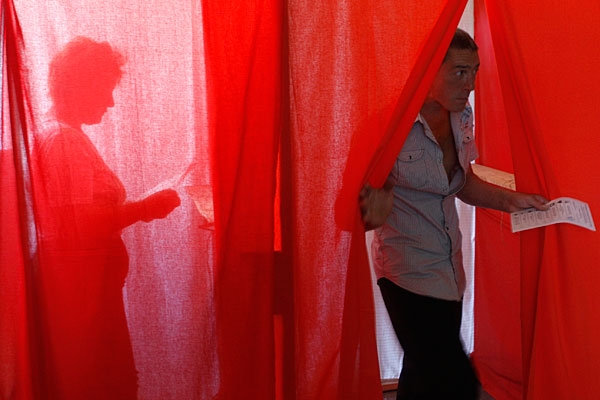
Moldova on the Threshold of Post-Post-Communism
Publication: Eurasia Daily Monitor Volume: 6 Issue: 165
By:

Two electoral cycles behind most of Eastern Europe, Moldova stands on the brink of the post-post-Communist era. Uniquely in Moldova, moreover, the post-communist transition and the post-post-communist era will be telescoped into a single stage, the start of which is now. Other East European countries traversed this process within 10 to 15 years after the Soviet Union’s and Soviet bloc’s demise. In Moldova’s case, however, this process was stunted (though not fully interrupted) by the communists’ recapture and maintenance of power through successful exploitation of formal electoral processes.
Moldova’s Communist Party took the first place in five consecutive parliamentary elections (1998, 2001, 2005, and April and July 2009) and was in power from 2001 to date. The communists are now being forced into opposition by the four-party Alliance for European Integration (AEI). Collectively, AEI outpolled the communists by 55 percent to 45 percent in the July 29 elections; and it forms a majority of 53 AEI seats versus 48 communist seats in the parliament that opened on August 28. The alliance is now poised to form a new government of its own. However, AEI needs communist cooperation for garnering at least 61 votes to elect the new head of state in parliament when President Vladimir Voronin lays down his powers in the days ahead.
The Communist Party lacks a coherent strategy for capitalizing on its remaining plurality of voter support to keep or regain power. The party’s leadership looks disoriented, its internal debates focusing on short-term tactics rather than a vision for the party’s possible evolution. The presidential institution and party leadership failed to cope with the challenges of the April and July pre-election campaigns and their consequences. Although they had sufficient grounds for self-confidence and an ecumenical campaign message, the communists based their campaign on mobilizing core constituencies and they projected a state-of-siege mentality. The April riots that destroyed the parliament and presidential buildings exacerbated the leadership’s bunker syndrome, but did not create it.
In his dual role as head of state and party leader, Voronin gave up the idea of reforming the Communist Party into a European-type Socialist party ahead of the April elections. By the same token Voronin’s party prioritized relations with Europe’s hard-left, marginal parties, in preference to European Socialist and Social-Democrat parties. Moldovan Communist Party leaders argued that the hard-left connection truly reflected their party’s identity, which they were not about to change. Significantly, this is the view of the Party’s young leadership echelon, people in their twenties and thirties who are being groomed to take over soon from the Soviet-bred generation of party leaders. This prospect seems to spell more sectarianism than moderation (Moldpres, Basapres, August 28-September 9).
In the July elections, the Europe-oriented Democratic Party made inroads into the communist electorate after only three weeks of campaigning. Led by the former parliament’s chairman (2005-2009) Marian Lupu, the Democratic Party’s emergence became the main causative factor in the Communist Party’s decline from 60 to 48 parliamentary seats. The Democratic Party is positioning itself on the left-of-center side of the political spectrum and is also the first "ethnic Moldovan" party to target the Russian/Russian-speaking voters in its strategy for the next electoral cycle. It is well placed to collect communist votes that will undoubtedly migrate from that party toward a moderate left. The Democratic Party is also well placed to cultivate contacts with the Socialist International and the Socialist/Social Democrat parties in European capitals -a train that Moldova’s Communist Party has irretrievably missed by preferring the marginal Left.
Three partly divergent, or overlapping tendencies are in evidence within the Communist Party at the moment. Both are tactical rather than strategic: the party’s "grey eminences" are proving yet again to be tacticians without strategy.
One school of thought advocates going into a "responsible opposition," delegating the necessary number of parliamentary deputies (at least eight) to elect the AEI’s nominee as head of state, allow the AEI government to manage the economic and social crisis in the months ahead, and count on the government’s failure in that regard to trigger new elections by 2010 or 2011. Meanwhile, the party would rid itself of "opportunistic elements" and await the chance to return to power under a rejuvenated leadership.
Another school of thought favors an irreconcilable opposition, so as to block the election of a new head of state in parliament, thereby triggering new elections as early as January 2010 and expecting a quick communist revanche.
Elements in both of those approaches would favorably consider the possibility of a "left-of-center" alliance with the Democratic Party (13 parliamentary seats) and Our Moldova (7 seats, smallest of AEI’s parties) in the hope of splitting the AEI. However, this is a non-starter to the AEI. The communists must now choose between the role of a slowly shrinking opposition in the next four years or a rapid collapse if the party is seen as provoking yet another round of elections in a futile quest for revanche (Moldpres, Basapres, August 28-September 9).




